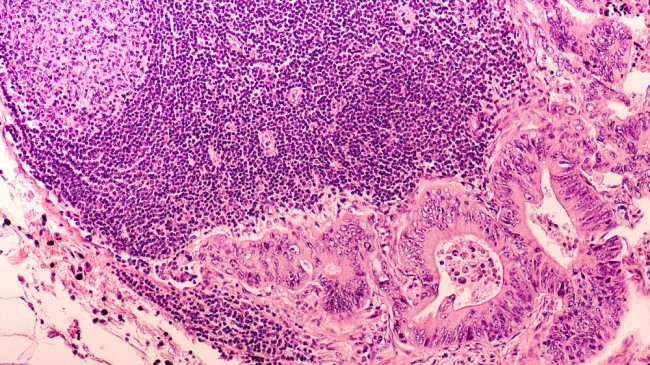New research unlocks the potential of bacteria to treat bowel cancer
Published: 19 November 2024
Fighting bowel cancer with the bacteria Salmonella could be a step closer thanks to a new discovery by researchers at the University of Glasgow and the University of Birmingham
Fighting bowel cancer with the bacteria Salmonella could be a step closer thanks to a new discovery by researchers at the University of Glasgow and the University of Birmingham.
The new study, funded by Cancer Research UK and published today in the journal EMBO Molecular Medicine, studied the response of T cells to a specially engineered safe form of Salmonella in mice with colorectal cancer.

The use of bacteria, such as Salmonella, to tackle cancer has been the focus of previous research to find new ways to combat the disease. However, bacterial treatments have had limited success because, while they do have a suppressant effect on tumour cell growth, they also suppress a part of our immune system which is essential to fight tumours.
Now, this new research has pinpointed the mechanism that causes the immune system to be suppressed and offers a solution to overcome the problem.
The team found that the Salmonella prevents T cells, which are key immune cells that help protect the body from infection and cancer, doing their job and stopping colorectal cancer cells in their tracks.
Bowel cancer is the second most common cause of cancer death in the UK. With around 16,800 deaths in the UK every year finding new ways to tackle the disease is vital.
Scotland is disproportionately affected by the disease with around 4,000 people being diagnosed each year.
The team found that the Salmonella depleted an amino acid called asparagine which suppresses tumour growth, but which also suppresses T cells by stopping their metabolic processes. The researchers believe that Salmonella bacteria could be further engineered to work alongside the body’s immune system so T cells can attack cancer cells alongside the bacteria.
Lead researcher Dr Kendle Maslowski, of the Cancer Research UK Scotland Institute in Glasgow and the University of Glasgow, said: “We know attenuated Salmonella and other bacteria have the power to tackle cancer, however until now it was not known why it was not proving as effective as it should be.
“Our research has discovered that it is an amino acid called asparagine that the bacteria attacks which is essential for T cells to be activated.
“We believe this knowledge could enable bacteria to be engineered not to attack asparagine allowing the T cells to act against the tumour cells leading to new effective treatments for cancer.”
First author, Dr Alastair Copland, Research Fellow in Immunology at the University of Birmingham, said: “Bacterial therapies are an exciting way to treat cancer by essentially starving tumours of vital nutrients. One longstanding mystery has been why T cells, which are key to fighting cancer, don’t function optimally during this treatment.
“Now, we’ve identified the protein responsible for this, and pinpointed an exciting genetic target that could help us unleash the full potential of this therapy. It’s particularly rewarding to turn a disease-causing bug like Salmonella into one that combats cancer.”
Bacterial cancer therapy has been a focus of scientific interest since the 19th century however, the dangers to health presented by bacteria had prevented it being explored further.
But its focus on the immune system led to huge strides in immunotherapy which harnesses our own defence mechanisms to fight disease.
Now, recent advances in genetic modification to make bacteria safe to use, have seen a resurgence of research in this area.
Director of Research at Cancer Research UK, Dr Catherine Elliott, said: “Bacterial therapies have not become mainstream despite massive strides in immunotherapies which use our own bodies’ immune system to attack cancer.
“But the power of bacteria has long been acknowledged as likely to hold significant potential to tackle disease.
“This exciting development from the Cancer Research UK Scotland Institute could lead to more effective treatments for patients with colorectal, and other cancers in future, providing hope for patients.”
Further research will now be undertaken to use this key discovery to develop future ways of harnessing the power of bacteria in cancer treatment.
Enquiries: ali.howard@glasgow.ac.uk or elizabeth.mcmeekin@glasgow.ac.uk
First published: 19 November 2024
<< MVLS News

